Deir Yasin
I never knew where Deir Yasin was. I knew the name well: it is the village which was attacked and its people massacred by the Irgun, a Jewish militia, in April 1948. This story appears in any history of the conflict. Observers generally agree that the terrifying news of the massacre precipitated the flight of 700,000 Palestinians from their homes in towns and villages. As often with such places of History, the real Deir Yasin, a small village of stone houses and trees, soon became a symbol, an abstraction, a metaphor. From a tiny village with little importance (militarily, economically or otherwise) it became a legendary, mythological place. I always imagined it on a barren mountain top or tucked in secret valley, somewhere in the hills west of Jerusalem. So it was quite a surprise for me to find out that it’s actually located in what is now the Jerusalem ultra-orthodox neighbourhood of Givat Shaul. On the second week of my stay in Israel I went to the memorial service commemorating 57 years to the massacre.
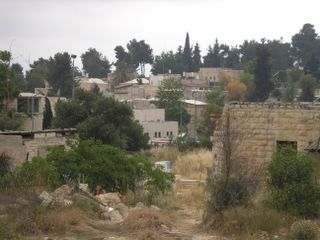
Deir Yasin / Kfar Sha'ul
The Deir Yasin ceremony was organised by Zochrot, a Israeli group which attempts to tell the story of the Palestinian displacement of 1948. Zochrot do a range of activities: they arrange walks to the ruins of Palestinian villages, where people tell stories and memories; they put signs (in Arabic and Hebrew) which indicate the previous names and uses of buildings and places; they hold lectures and talks about the Nakba. The group is made of Jews and Palestinians; their activities are generally made for a Jewish audience, because the story of the disaster of 1948 is rarely told in Hebrew; the Israeli public – even its ‘leftist’ side – is usually defensive and hostile when it comes to 1948.
The service was held in a little garden, overlooking the valley. It was simple, straightforward, and extremely moving. A representative of the memory committee of the village talked about their wish to build a memorial museum for the victims. She talked about the dead, who were buried in a mass grave in the valley, and how this site should be respected ‘just like the Jews are respecting and commemorating their dead victims, from Europe’; Yad Va-Shem, the Israeli Holocaust Museum, is located on the other side of the valley, on Mount Herzl. Not far from it is the State cemetery, where soldiers and Zionist leaders are buried.
Many orthodox kids gathered around us during the ceremony. There were quite a few policemen there, in case it gets unpleasant (some events of Zochrot were attacked in the past). But nobody tried to interrupt the service. They stayed there, watching quietly, throughout the songs and the speeches.
Um Salah, an old woman who survived the massacre, slowly took her place on the stage, dressed in the traditional dress. She told her story, opening every sentence by saying ‘I pray for the Prophet’. She saw her young brother Musa, 14 years old, killed in front of her eyes; then she and her family were driven out of their homes and told to go to the Arab neighbourhoods of Jerusalem. ‘They attacked us in three in the morning’ she repeatedly said. ‘We never did any harm to them. We always had good relations with the Jews, we celebrated their festivals with them and they came to visit us on our festivals’. (Israeli historians agree that Deir Yasin was not a ‘hostile’ village; it had an agreement with the Jewish forces, but this did not prove to protect it.)
Her daughter, dressed in trousers and a head scarf, spoke briefly after her, in quick sentences. ‘I just want to say that I wish we could visit the houses of the village. Everybody wants to see the place where his parents came from, she said. We heard so many stories about it … it was very different then, when people lived in villages, there was a strong solidarity between them, in times of celebration and in times of mourning. Today everybody is running around caring only for themselves’.
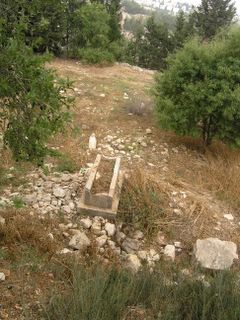
Some of the houses of Deir Yasin are still standing. After the war the site was turned into a mental hospital for Holocaust survivors. Yes, a mental hospital for Holocaust survivors. Whoever came up with this idea must have had an especially sick sense of humour, or an aspiration to become an existentialist playwright. It is still a mental hospital today, and the original villagers and their families are not allowed to go inside.
The exact number of the victims is unclear, but estimates run between 110 and 140. 93 names are known. ‘Worse massacres happened in Palestine’ said the woman from the village memory committee, ‘but this one was important because of its devastating effect on the whole of Palestine’. ‘400 villages fled their homes after they heard of Deir Yasin’ said Um Salah.
At the end of the service, the 93 names of the victims were read out. One of the people who read the names was Mordechai Vanunu, the famous ex-nuclear prisoner. He had a nice Moroccon accent, pronouncing ‘Hejj’ with a ‘French’ j. Other readers had a strong and unpleasant Israeli accent; this was perhaps the only moment of discord for me.
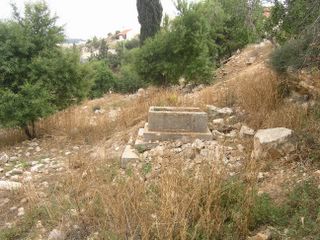
Afterwards I want with my friend Yoav to look for the cemetery. We crossed the road and jumped over a stone fence. We found a few shattered bomb stones down the slope, beneath the almond trees. ‘Astonishing, to think that this is it…’ said Yoav ‘the open nerves of the conflict are here. And see how it looks: just a piece of land, indistinctive, with no sign that something ever happened here, just an old tombstone and a pile of stones.’
I picked some green almonds from the tree and tasted them. It’s been years since I tasted fresh almonds, since school trips I suppose. The taste filled my mouth: sour, slightly bitter, juicy and refreshing. The almond trees of Deir Yasin: I wondered if they were there before 1948.

Strangely, the service made me optimistic. It was full of good intentions, of good will. It was refreshing in its non-official spirit. If only Israelis would stop and listen, I thought. The Palestinian women who talked at the service did not talk in grand words and in great historical pathos. They talked about the tragedy of Deir Yasin, which no one disputes. They did not seek revenge; they did not come to claim back their land. They talked about reconciliation, and about making the cemetery into a memorial site, about building a museum, about visiting the site of the village. Who could deny these simple, sensible words?
But most Israelis don’t want to listen. Any discussion of the Palestinian tragedy is seen to undermine the existence of Israel. Any empathy for the displaced Palestinian is seen as a denial of the right of Israelis to live on this land. As if everything that was built in a hundred and twenty years since start of Zionism – the cities, the villages – is no more than castles in the sand that can easily be destroyed at any moment. As if someone could simply pull the carpet beneath our feet. And so, terrified by the precariousness of their existence, Israelis continue to build, more roads, more fences, more walls, more settlements. But all the layers of concrete and asphalt do not give Israelis a sense of security and stability; on the contrary. Perhaps it is the suppressed memory of the displacement of Palestinians which makes it impossible for us to feel at ease.
I don’t agree with everything Zochrot say and do, but I thought the service was touching and beautiful. And I think that both Israelis and Palestinians have to come to terms with what happened in 1948. There is no way round it, if we want to live together.
When I got to Tel Aviv that night, I noticed I lost a book by Primo Levi during the service. How annoying. Not only to lose the book, but to lose it there… I hate the way stories of the Holocaust in Europe and the history of Israeli/Palestine sometimes get entangled, I think it usually just complicates things. But as I found myself, it’s difficult to avoid it.
* * *
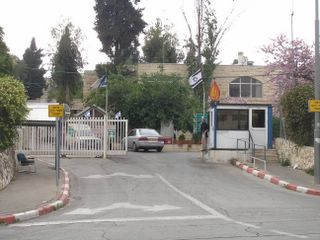
On Independence Day, I want back to Deir Yasin to take some pictures. As I parked outside the mental hospital, and was looking through my camera, a small orthodox boy came on his bike and stopped next to me. He had orange sticker saying ‘Supporting the Gaza settlers’.
Crazy people live inside there. He said. Why are taking pictures?
It used to be a arab village, many years ago.
Are you for the Gaza settlers? He asked me.
No. I said. He wasn't sure what to make of this. Are you… secular? He said the word as if it was a strange incurable disease.
Yes.
You know, I ride a bike too, I said.
‘So how come you’re in a car?’ He wasn’t stupid.
A friend of mine went on a holiday and I’m looking after her dog, so she left me her car as well.
What’s the name of the dog?
Pancha. What’s your name?
Yaacov.
Can I take your picture?
He nodded.

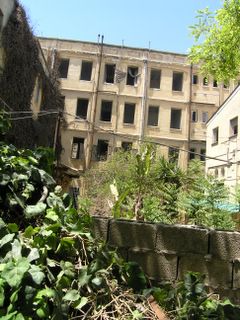
From the back
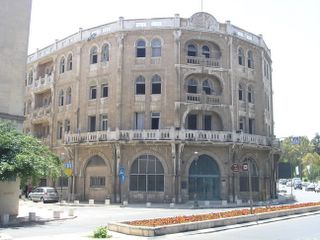
Palace Hotel
Empties of Jerusalem - 2 - Palace Hotel
Rooms: hundreds! the windows are open so they must be full of pigeon shit
Access: jump the fence round the back, and then maybe you'll have to climb a bit...
History: built by the Supreme Moslem Council in the 1930s. A project superivsed by the Mufti Hajj Amin Alhusseini, but it was not very successful as a hotel. After 1948 was in the Jewish part of Jerusalem. It served the Minstry of Commerce, until they vacated two years ago.
Best for: historical squatting with political twist
Plans: will be renovated and made into a hotel again, dunno when
Possibly unfriendly neighbours: opposite a cop shop and 100m away from the American consulate.
The photographs, which I found at the archive of Imperial War museum a year ago, were taken here, on this platform. They were on the train, about to leave; it was the early 1940s. If they were leaving for Jaffa, or travelling further, to Europe, I do not know. Something tells me it was an official farewell, not simply a day jouney. The pictures show a short and plump British official, wearing short sleeved uniform. His sportive manners seem awkward. His smile, beneath a thin moustach, seems affected: it does not succeed in its role, to stiffle this official situation with thick layer of normality. They look out of place, completely out of place, lost in sea. The old dying general. The priest. The mother, her two daughters, the little boy. Exiled nobility, now leaving Jerusalem. So painful is their reserve, they look not quite alive. Their expressions evoke neither pity nor compassion. Yet their eyes, looking deep into the eye of the camera, have the most uncanny effect. As if the whole world is out of place, and not just them. These photographs moved me so much.
Empties of Jerusalem - 1 - Jerusalem Train Station
Rooms: Many. High ceilings. Very messy. Shattered glass, stones, junk.
Access: walk in from the back. All the windows broken. Just climb in.
History: Built 1890s, a local Jewish entrepeneur and a French railway company, connecting Jaffa and Jerusalem. 1946 Bombed by the Irgun - Jewish resistance/terrorist organization. Used by the Ottomans, the British, and the Israelis.
Empty Since: 1998, two years after the service to Jerusalem was cancelled.
Water, Lecky: Bring your own. Seriously, this is Israel... first thing they do is cut these off, and don't expect anybody to connect you.
Best for: squat parties.
Likely to last: 2 hours.

Control room

Jerusalem trains station

please
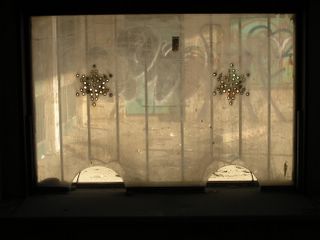
ticket office (suitable for gigs)

Jerusalem train station
At the Pathological Institute
"Hi, I called you a few days ago... about the slides from my liver biopsy, which I did here ten years ago. I've come to collect them". I'm standing half way through the door, with my bag on one shoulder.
"Sit down". It's more a command than a suggestion. I obey, feeling a bit embaraced for my lack of manners.
One hand covers her mouth, while she looks at the computer screen in dismay. "I.D number?"
On the desk, she finds a small box, containing a number of small thin glass plates. She takes a few of them out and looks at them, one by one, puzzled. Her head moves forward and backwards, as if she is a robin, about to snatch a tasty worm. On each slide there is a coloured blot, a stain, like a Rorcschach test. Is this really a piece of my liver there? or is it just printed someohow? I start to become suspicious. Perhaps it's not really my slides. Maybe it's not my liver. How can I tell? Now she holds them all in her hand, like a pack of cards, contemplating carefully before she lays down the trump.
From the corridor I hear someone saying. "It's a placenta. A placenta. Waiting in Mount Scopus".
She suddenly places them down on the table.
"OK. You'll have to go and pay the fee. Go out the corridor, past Fertilation, and you'll see the office. 221 Shekels I believe."
"Do they accept cards?"
"I think they like money in all forms".
When I come back she is wrapping the slides in a padded box. "Please return them to us if you can".
"I will, but in a few months. Are these really the original pieces of my liver?"
"Yes. Very thin slices, coloured and soaked in Parafin, and then embedded in the glass. Be careful not to break them. Where are you taking them to?"
"London. I live there at the moment."
She turns to me, anxious.
"But you said you'll return them.. Oh, please, please say you'll return them to us!"
I have no choice but to reassure her.
One of the comments on
Raed's blog gave a link to this Palestinian news website,
http://www.alwatanvoice.com. It's published from Gaza (in Arabic) and it's riveting... an uncensored lively discussion on all issues. Epecially fascinating is the debate on the transformation Hammas is going through. Hammas has changed its tone considerably in the last year (signalling some willingness to negotiate on a two state solution). This month they won the municipal elections. They are set to do well in the Parliamentry elections in summer, maybe even to win. Their popularity comes from their image as free from corruption, and also because Palestinians generally belive that Hammas actions are driving Israel out of Gaza.
The People of Shukba against the State of Israel
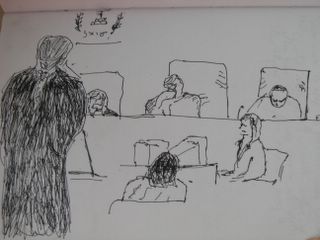
When I wake up it's 8.30 already. 'Fuck, the hearing starts at 9... better get out of here ". I look for clean underwear but can't find one. Wel, I'll just have to go without. I put on my half-length trousers , long stripy socks, get on my bike and pedal up the hill to the Supreme Court.
I was supposed to go there with N. "On monday there's an important hearing about the fence... there going to discuss the Hague's verdict for the first time" he told me last week, when we met in Tel-Aviv. But he couldn't make it, so I decided to go by myself. Partly as a solidarity with my housemates in London, who are also going to court today, to fight the eviction; but mainly to see the occupation once more, from close sight: true, no tear gas and shock bombs here, just air-conditioning, suits and legal niceties, 'my honorable friend'. But behind these facades, the court room and the check point both belong to the same world. Without one, the other could not exist.
In the audience I recognize a Foreign Office spokesperson - he used to show up occasionall on the BBC, when I still watched, and speak in an especially obnoxious manner. "I want my daughter to be able to go to the Discoteque!" he once shouted at the interviewer, after a suicide bombing or a Israeli incursion, i can't remember.
The hearing starts with Judge Barak - the head of the Supreme Court - annoucing, in his thin and squeeky voice, that Judge Jubran (the only Palestinian judge) has disqualified himself, because his brother lives in A-Ram, which is about to be discussed today. A-Ram is a suburb of Jeursalem which will be cut off from the city after the completion of the wall.
The State presents an elaborate multimedia installation, showing the exact location of the fence in the villages Budrus and Shukba. 'And this is the north section, where we will have to move two olive trees, because other alternatives are not practical'. Beneath the polite language I think I can here the attorney grinding his teeth. I wonder if he's about to lose it and shout 'It's just two fucking trees for fuck sake get the bulldozers out there and get them out of my sight you supreme cunts!'; but he manges to keep his composure. Euphomisms fly in the room: 'this hill will have to be 'uncovered'' (that is, all the trees uprooted). 'We will provide a solution for the fig trees'. They keep reffering to the Wall as 'the barrier'; even the Supreme Judge get confused for a second and calls it 'the wall', but then he corrects himself: the fence. The Israeli writer David Grossman called this euphomistic occupation-speak 'the words' laundromat'.
After the break, I decide to stay outside a little longer. The next speaker is from a right-wing group 'Fence for Life' pushing for the wall to be built faster. Can't be bothered with that, I thought. But when I go in I found that this is actually the fun bit. The judges don't like him at all.
-The court should understand that these legal proceedings are impeding the construction of the fence....
-Are you saying we are the obstacle? can you prove this?
-Army officers told me that previos rulings have largely discouraged them...
-Are you suggesting that we issue a verdict of encouragment?
-Your honour, while the fence is not yet completed, anyone can cross the line, I am talking about buses blowing up...
-Plese do not try to scare the court.
-There are some quite nightmarish scenarios...
-Sir, if you suffer from nightmares, I suggest you consult a psychaitrist, and not waste our time. -I'm sorry, but I have to put forward the unpleasant truth. Thank you your honour. And can I be excused? ... if my presence is not needed anymore...
Judge Barak murmurs 'we let you argue your case, it's appropriate that you stay to hear the plaintiffs'.
Lesson no.1: don't say bad things about the court, or you'll have to stay after class.
I suddenly notice that almost all the people here - judges, lawyers, members of the public, Israelis, Palestinians, men, women - wear wedding rings. As if behind this disagreement, they all belong to one camp, a secret society of married people. I feel strange about not having one... The hearing continues.
Muhammad Dahle, the lawyer of the people of Shubka, provides the best speech of the day. He is incredibly sharp and witty. I can tell the judges like him; I think I can even see a sense of pride in their eyes, like a teacher being challenged by a favourite bright student. A Palestinian lawyer arguing in Hebrew, better than any Jewish Rabbi!
Lesson no. 2: Nothing makes the judges more happy than a Palestinian Lawyer using Talmudic expressions, in Aramaic. The Zionist dream come true.
At no point does Dahle or the plaintiffs ask the court to accept the Hague ruling; this is a lost case. They ask, however, to listen to the logic of the Hague ruling. Dahle keeps trying to remind the judges the bigger picture. "The State would like to atomize the whole issue of the fence and have us debating this stretch and this village... while we say a simple thing: this is a huge project, it involves billions of dollars, constructing a defence line 650 km in length - don't tell me it's a temporary measure. This is annexation de-facto of 9 percent of the West Bank - for years, if not for generations."
"Let me understand" interrupts him one of the judges "you're saying that the fence should not be built at all?"
"Personally, I am against borders, your honour."
"And more to the point?"
"The State can construct the fence on Israeli territory, if it wishes to do so. If the fence crosses into the occupied territories, the State has to prove that it is an utmost necessity, not simply a 'better route'.'
Later I call N. "How was it?" I tell him of my despaired impressions: on the one hand, the judges listen to the lies of the State about olive trees 'successfully replanted' and 'special gates for farmers'; on the other hand, they refuse to see this as annexation of occupied land, they refuse to see the logic behind things. "True, the supreme court always evaded the big questions" says N "the legality of the settlements, the application of the Geneva conventions... but don't slag these procedures off so quickly. The last ruling made them change the entire route south of Hebron, and it now passes on the 67 borders. And the State have to sweat hard for every olive tree they want to uproot. They gradually learn the hard way that they can't do whatever they want.'
'I think they could probably have gotten away with the whole thing' says N, 'With more or less land grabbed and trees uprooted. But the project will fall apart in Jerusalem. What they are about to do in Jerusalem is total madness. They are going to tear the city from its Palestinian suburbs in the west bank, and destroy the daily lives of tens of thousands of people. The fabric of the city is about to be torn in the most artificial and sensless way, in a matter of a few months. This is sheer maddness. And I don't think it's going to work.'
=-=-=
Bad news come from the other court hearing, the one in London: possession order granted forthwith. We are getting evicted. It's my seventh eviction in three years....
Bil'in video
If you have a fast internet connection, take a look at
http://stage.co.il/media/largefiles/eranvered475288.wmvit's a short video on Bil'in, the wall and the demos. Including footage from the demo I participated in a week ago. should say again that i was not in the front so it didn't look as scary as it does on the film. With English subtitles. One thing you can see in the film is teargas grenades being shot in direct line at demonstrators from very close range - this is against army orders.
a sunny day
I'm at the Jerusalem municipal archive. Reading through protocols of the Street Naming committee, 1945-1946. I have no choice but to hear holocaust stories: the Archive clerk is telling the delivery boy all the stories she saw last night on TV. It's holocaust memorial day. "And then they told them to take their clothes off..." I find it hard to concentrate on the dusty protocls. "And they didn't do any harm to anybody... and they just put them into the chambers..." concentrate. 3rd of January 1946. on the agenda: the reaming of streets in the old city.
Now they moved to discuss their payslips. "Are you getting paid for Indepandence day?"
The archive closed on 1pm. It's sunny and pleasant, so I decide to stroll round the Russian compound area and look for inscriptions on houses. I reached a building I've somehow never visited before. It used to be a guest house for Russian women pilgrims during the late 19th century. After 1918 the British turned it into Jerusalem's Central Prison. Today it's a museum, dedicated to the memory of Resistance Prisoners - that is, Zionists which were imprisoned by the British, and some of them were executed there.
The building is beautiful. And it's surprising how easy it was to turn a guest house into a prison: all they needed was to put doors and metal grills and that's it basically. But I guess the pilgrims also needed to be controlled in a sense - they were peasants and poor people, and the pilgramages were organized by the church and the royal court . I thought about Foucault's notions of architecture designed for discipline and suveirllance: from the prison's/guesthouse wide corridor it's easy to monitor all the seperate rooms.
In one of the museum's displays, under a big title 'The British limit Zionist Immigration' I found myself staring at the child from the Warsaw Ghetto, in life size. I've seen this photograph probably hundreds of times: it shows a small boy, probably six years old, wearing a coat and a beret; all terrified, he is holding his hands up in the air. It was taken when the survivors of Ghetto uprising surrendered themselves; soon after that they were sent to the death camps. The picture is so strong it never fails to affect me. I felt my stomach churn. I felt like somebody is pushing my buttons. Like someone is physically holding my heart and twisting it and would not let go. I felt angry, and powerless.
I'll say something which is perhaps obvious: to link this image of pure horror to the British policy on Jewish immigration to Palestine in the late 1930s is manipulative. There is nothing which links this boy, the liquidation of the Warsaw Ghetto, to what was happening in Palestine, in any immidiate way. The dead boy becomes a symbol, an icon. Jewish destiny, distilled and fetishised into one poor dead boy. And all of us, we are him, always: six year old, helpless, and holding our hands up. Always the victim.
To recognize that this is a manipulation does not mean it doesn't work. Of course it works. This is why I got so upset. In the case of my family, I know the facts very well: my grandmother (on my mother's side) was from Warsaw. She arrived here a few months before the war. Had she not received a visa, through fake marriage, she would have perished. Very simple. In her case, being zionist saved her life. But to take images of victims and turn them into illustrations, to the winning argument in a debate over Palestine, a debate most of them had no connection to... to use tragedy as a blank cheque, a justification for everything Israel ever did and will ever do; to perpetuate this feeling of victimhood through endless brainwashing...
Last year, on a late summer Thames beach party outside Royal Festival Hall, I bumped into J near the bonfire. A good looking Jewish boy from Melbourne, or Sydney, I can't remember. He was off his tits, and I could see the pills in his eyes, his pupils going all over the place.
And you... you're from Israel, he started, emotional and dreamy. Israel... you know, a world without Israel would be a totally different place, I would find it much more difficult to live. For me... Israel gives some meaning to this world.
Have you ever visited there? I asked him.
No, he said. One day I'll go.
He suddenly raised his eyes and looked at me: sorry, I don't know how you feel about things.
Listen, I said, I just want to let go.
He didn't get me. He thought I was talking about leaving Israel. "Sure, I understand, but you can do that only because Israel exists... you know, people usually don't think I'm Jewish, and what they say about Jews... it's scary. Antisemitism never disappered, it's there."
What I actually meant was that I want to let go of people like him. I don't want my country to be his insurance policy, his emergency shelter for when things go wrong, the place which helps him sleep better at night. I feel like I'm being used, like my only reason of being here is to provide some existential comfort to some middle-class kids who really lives very well, compared to 98% percent of the people on the planet. He needs a therapist, not a state in the Middle East waiting patiently for him to jump the boat (which will probably never happen).
How is it that a Jewish boy from Australia grows up with such fears and neurosis? I think that the memory of the holocaust, as it was shaped in late 20th century, created this notion of antisemitism as a Jewish destiny, a danger which is always lurking in the dark. From a concrete atrocity it became an existential trait of being Jewish. Of course antisemitism exists, on some level. But compare it - today - e.g. to racism against blacks... who is more likely to get discriminated against.
I continued walking through the corridors of the prison, through the open courtyard. A large group of soldiers in their basic training were sitting there, politely listening to the explanation. (in basic training, you can't affort not to be polite; their officers were standing nearby, leaning on the wall).
I saw a sign pointing to the gallows: I decided to give it a miss.
Graffiti I saw today in Tel Aviv:
- You're all robots, only made of flesh
- melt suffering into pain
The started priting poems on the rubbish collecting trucks. Strange, no?
free range
At the market today I stopped at the Health Food shop to get some eggs. It's a shop I like a lot, I still think of it as 'Cherry Blossom' although they renamed four years ago to the hideous 'nature-net'. Anyway I found the eggs at the fridge. And when I took one box out, I relized what was written on it: Organic Free Range Eggs from 'Hills of Eternity, Samaria'. I felt like throwing up. I quickly put them back and went outside. 'Hills of Eternity' are a settler outpost near Nablus. The settlers there are probably the worst in the occupied territories (although there's some hard competition). For some years now they have been terrorizing their Palestinian neighbours and any internationals or israeli activists who tried to help them (assault, murder, polluting their drinking water...
see this article from Haaretz two years ago). Their leader is now a fugitve after even the IDF and the Courts decided to arrest him.
Beside the anecdote, there's a point I wanted to make. Many of the settler outposts are occupied by young settlers who are anti-authoritarian, hippie-new-agey-spiritual types, who talk a lot about the connection to nature and earth and so on, and they are the most hardcore racist bastards around. Eco-friendliness does not guarantee 'leftist' politics. Many of us share, to some degree, the rejection of oldstyle notions of modernist 'progress' (a naive belief in industry and science and o forth), but this rejection can be taken to very dark places.
Perhaps the link between 'nature' and reactionary politics is not new. Nazi supporters and sympathizers were a strange mixture of those who idealized nature and rural life, and those who worshiped modern industry and power in the shape of cars and tanks. But then at least it was easier to tell the difference. The Left was all for progress and industralization, dams and factory chimneys. Today it's more difficult to place ecological politics into left and right; indeed I'm not sure these terms are still valid.
I found an
interview with Jonathan Pollak, the Anarchist againt the Fence who was wounded at Bil'in two weeks ago (it didn't stop him going there last week). Sums things up about the wall and the Gaza pullout.
I found a photograph of this advertisment from the 1930s. This is to prove that people here were always nutters, it's not recent:
THE GREAT MIRACLE OF PENMANSHIP'S WONDERS
Come and witness the unheard of miracle of penmanship! Hurry to visit the wonder
of wonders, exhibited at the Luna Parc, Levant Fair Tel Aviv."
SEE WHAT THE HUMANE SKILL HAS ATTAINED IN PENMANSHIP
== TWO WHOLE CHAPTER OF THE PSALMS, 300 LETTERS LEGIBLY ==
WRITTEN ON ONE SINGLE WHEAT GRAIN, and other miracles of excellent penmanship never seen until the present.
VISIT THE LUNA PARC. For 10 mils admission fee you will see the greatest miracle of penmanship the world did ever see."
Minks of the World, Unite!
I'm not the only
mink blogging. Unfortunately I have no idea the other mink writes about ... but i like the name.















